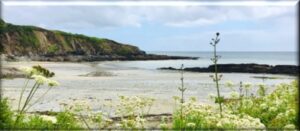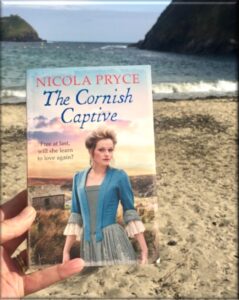 I’m delighted to share my favourite scene from The Cornish Captive. Set in a busy harbour on the south coast of Cornwall in 1800, Madelaine Pelligrew, a French aristocrat by birth, is walking on the beach for the first time in fourteen years. Recently released from false imprisonment she had almost given up hope of freedom. As she walks, revelling in the feel of the sand beneath her feet and the wind in her hair, she sees a seagull trapped in the rocks.
I’m delighted to share my favourite scene from The Cornish Captive. Set in a busy harbour on the south coast of Cornwall in 1800, Madelaine Pelligrew, a French aristocrat by birth, is walking on the beach for the first time in fourteen years. Recently released from false imprisonment she had almost given up hope of freedom. As she walks, revelling in the feel of the sand beneath her feet and the wind in her hair, she sees a seagull trapped in the rocks.
The struggling seagull triggers a need in her to free it. Equating the bird’s desperate attempts to free itself with her own plight, she ventures beyond the shingle. At once, her foot sinks into sand, her shoe becomes trapped, and her panic rises. A French frigate captain is also walking on the beach: a prisoner on parole, he has previously helped Madelaine find accommodation and he wades out to assist her.
‘The water was deeper than I thought, up to his thighs, but he kept striding out and I held my breath. He reached the seagull and held it up. It lay still in his hands, not the slightest movement and I covered my face, unable to stop my violent sobs. ‘Oh no … no…’
The need to free it had been so powerful. I could feel myself shaking, a growing sense of agitation. My heart was thumping, pounding with sudden irregularity and I fought to breathe. Everywhere was too vast, the seagulls too loud, the sky too high. He stood smiling across at me, holding up the dead bird. ‘A piece of white drift wood, that’s all. But I must admit it looked very like a seagull struggling against the rock.’
 Madelaine is very vulnerable at this stage and Piere de la Croix has already shown her great kindness by leaving a bowl of fruit for her at the inn. Yet she shies away from him, hiding behind her false name.
Madelaine is very vulnerable at this stage and Piere de la Croix has already shown her great kindness by leaving a bowl of fruit for her at the inn. Yet she shies away from him, hiding behind her false name.
‘Please don’t think me ungrateful. My brother-in-law doesn’t take kindly to your interference. We must never meet like this again.’
‘As you wish.’ His voice held sadness, a stiffness in his manner as he pointed me up the beach.
‘That includes oranges, Captain de la Croix.’
He reached for his jacket. ‘Once a ship’s captain, always a ship’s captain – always vigilant for the signs of scurvy. You will get better, Mrs Barnard, and quickly, too. Just eat as many oranges as you can and drink the juice of lemons and limes.’
 His hair was ruffled, dark lashes framed his eyes. He held up his hand to shield them against the sun. I did not want to see the kindness in his eyes, nor hear his consideration for my welfare. He was lying. All men were liars. He was a Republican spy: his only intention to trap my brother.
His hair was ruffled, dark lashes framed his eyes. He held up his hand to shield them against the sun. I did not want to see the kindness in his eyes, nor hear his consideration for my welfare. He was lying. All men were liars. He was a Republican spy: his only intention to trap my brother.
Above us, soldiers in scarlet jackets watched from the fort. One was holding a telescope to his eye and Pierre smiled. ‘Do they think I’m about to steal a rowing boat?’ His laugh sounded hollow, a sadness in his shrug. ‘I’m allowed this far … yet they don’t like me being so near their fortifications.’
Later, Captain Pierre de la Croix carves a seagull out of the driftwood and it becomes Madelaine’s symbol of escape. The beach, too, features several more times: indeed this scene foreshadows a turning point in the story which is why I have chosen to share it with you.
